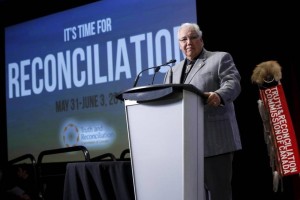Moving Forward After the TRC Report

Over the past summer, the Truth and Reconciliation Commission (TRC) put forth ninety-nine recommendations to address the ongoing historical violence Indigenous people face. Issues addressed include the continuing legacy of the residential school system, missing and murdered Indigenous women, and the attempt to restore relations between Indigenous people and other Canadians. The continuing violence many Indigenous people face on a daily basis is outrageous, but the TRC Report provide a new and substantial resource in attempts to correct the process of “cultural genocide” in Canada.
The TRC recommendations included:
Educational Reforms
Implementation of new federal legislation on Aboriginal education and the elimination of the discrepancy in federal funding for Aboriginal children going to school on reserves and children educated outside their Aboriginal communities.
Cultural Reforms
The federal government’s acknowledgment of Aboriginal language rights, including requiring post-secondary schools to develop programs in Aboriginal languages. The survivors of Aboriginal residential schools who had their names changed forcefully should have fees waived when changing their government-issued identification back to their birth names.
Child Welfare Reforms
All levels of Canadian government should reduce the number of Aboriginal children in care, and set national standards for those in care. Currently, Aboriginal children represent a disproportionate amount of children in the child welfare system. Furthermore, the Jordan’s principle should be implemented to resolve jurisdictional disputes. Services available only off-reserve would have any government department paying for services first, and seeking reimbursements from the accountable department after the fact.
Health Reforms
The TRC calls on the Canadian government to establish measurable goals to close the gap between Aboriginal peoples’ and other Canadians’ health outcomes. There should also be sustainable funding provided for Aboriginal healing centres and recognition of Aboriginal healing practices within the healthcare system.
Justice Reforms
The federal government should be working with Indigenous organizations on a variety of issues. They include: calling a public inquiry into missing and murdered Indigenous women and girls; reviewing and amending statutes of limitation for historical abuse against Indigenous people; working to eliminate the overrepresentation of Indigenous people in custody; allowing trial judges to deviate from mandatory minimum sentences; and working to settle claims from residential school survivors excluded from the settlement agreement such as the Métis and those who attended day schools and/or went to residential schools in Newfoundland and Labrador.
These are just some of the progressive reforms included in the TRC Report. Others include: developing and implementing strategies to identify, document, maintain and commemorate cemeteries at former residential schools or other sites where the students are buried; increasing funding for the CBC/Radio-Canada so that it can better support reconciliation and include the languages and perspectives of Aboriginal peoples; and changing the Oath of Citizenship to include language surrounding “Treaties with Indigenous Peoples.”
Following the release of the TRC Report we now wait; to what extent will the TRC recommendations be followed? Unfortunately, there have been ongoing injustices for Indigenous people such as continuing cases of missing women, ongoing land disputes, remaining prejudice, etc.
Most recently was the twentieth anniversary of the police shooting of Aboriginal protestor, Dudley George, at Ipperwash Provincial Park. There was a long-term land claim dispute, which resulted in Dudley’s death when he was killed during a confrontation between the OPP and protestors who were occupying the former army camp to bring attention to their demands. In 2007, Commissioner Sidney B. Linden called on the federal government to return the former army camp “immediately with an apology and appropriate compensation.” Eight years later, there is now a proposed $95 million land deal constructed with the federal government in attempts to return the land Dudley died trying to reclaim.
However, community members—including Dudley’s brother—are upset with the terms of the deal. Descendants of more than a dozen families who lived on the land were evicted in 1942 to make way for an army training camp. Sadly, stories such as these are not nearly as rare as they should be. Social injustices continue to persist for Indigenous people; however, we can hope with positive strides made in line with the TRC recommendations, constructive changes will ensue.
